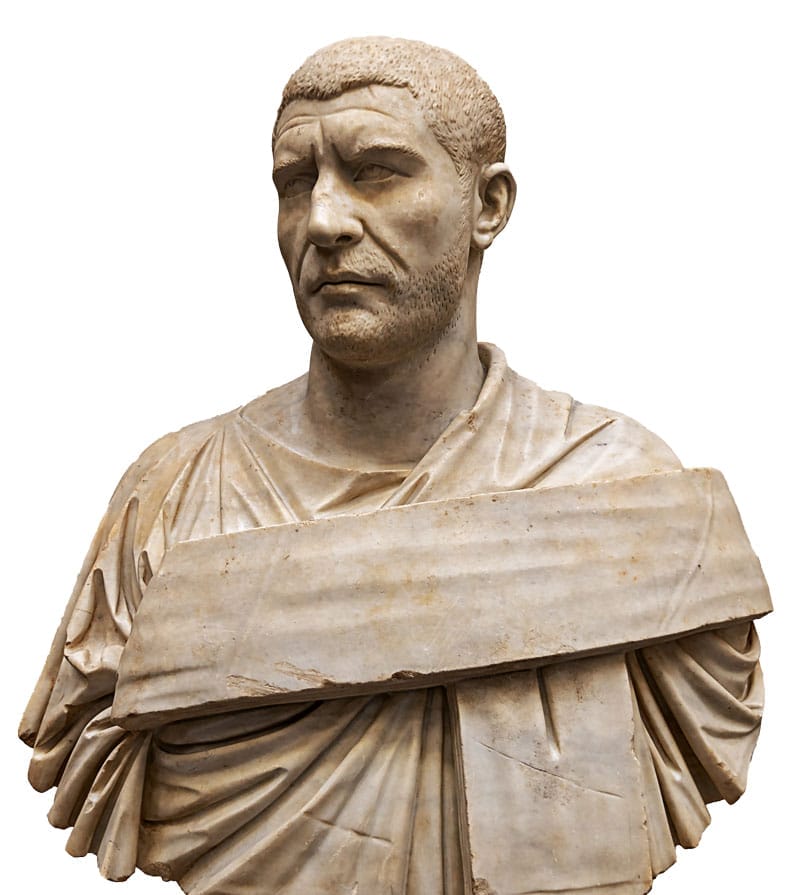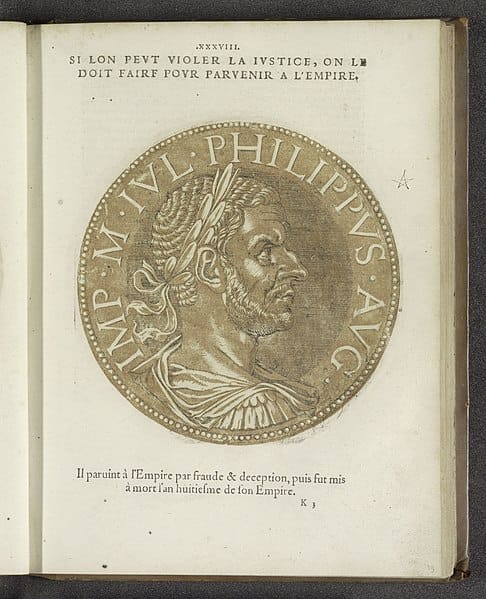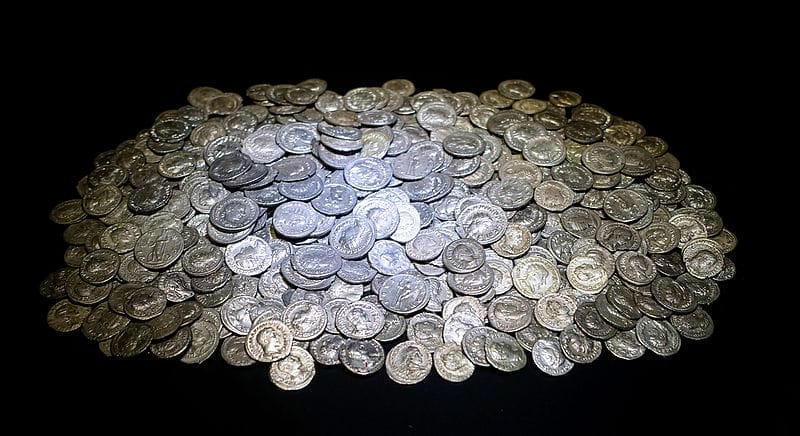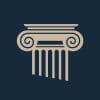Life: AD c. 204 – 249

- Name: Marcus Julius Verus Philippus
- Born AD ca. 204.
- Consul AD 245(?), 246(?), 247.
- Became emperor on 25 February AD 244.
- Wife: Marcia Otacilia Severa (one son; Marcus Julius Philippus).
- Died at Verona, Sept/Oct AD 249.
Early Life
Philippus was born in about AD 204 in a small town in the region of Trachonitis in southwestern Syria as the son of an Arab chieftain called Marinus, who held Roman equestrian rank. He was to become known as ‘Philip the Arab,’ the first man of that race to hold the imperial throne. He was the deputy of the praetorian prefect Timesitheus at the time of the Mesopotamian campaigns under the reign of Gordian III.
At the death of Timesitheus, which some rumors claim was the work of Philippus, he acceded to the position of commander of the praetorians and then incited the soldiers against their young emperor. His treacherousness paid off, for the troops not only hailed him emperor of the Roman empire but, on the same day, also killed Gordian III in order to make way for him (25 February AD 244). Philippus, eager not to be understood as the murder of his predecessor, had a report sent to the senate, claiming that Gordian III had died of natural causes, and even prompted his deification.
The Death of Gordian III
The senators, with whom Philippus managed to establish a good relationship, thus confirmed him as emperor. But the new emperor was well aware that others had fallen before him due to their failure to make it back to the capital, leaving others to plot. So, Philippus’ first act as emperor was to reach an agreement with the Persians. Though this hasty treaty with the Persians hardly won him much praise. Peace was bought with no less than half a million denarii to Sapor I, and an annual subsidy was paid.
After this agreement, Philippus put his brother Gaius Julius Priscus in charge of Mesopotamia (and later made him commander of the entire East) before he made his way to Rome. Back in Rome, his father-in-law (or brother-in-law) Severianus was granted the governorship of Moesia. This appointment, together with that of his brother in the East, shows that having reached the throne himself by betrayal, Philippus understood the need to have trustworthy people in important positions.
Establishing the Dynasty
In order to further increase his grip on power, he also sought to establish a dynasty. His five or six-year-old son Philippus was declared Caesar (junior emperor), and his wife, Otacilia Severa, was declared Austusta. In a more strained attempt to increase his legitimacy, Philip even deified his late father, Marinus. Also, his insignificant hometown in Syria was now elevated to the status of a Roman colony and dubbed ‘Philippopolis‘ (City of Philip).
Some rumors have it that Philippus was the first Christian emperor. This, though, appears untrue and is most likely based on the fact that he was very tolerant toward the Christians. A simple explanation to dispel Philip’s being a Christian is to point to the fact that he had his own father deified.

Philip is also known to have clamped down on abuses in the treasury administration. He felt a deep dislike for homosexuality and castration and issued laws against them. He maintained public works and improved some of the water supply to the western part of Rome. But he could do little to ease the burden of extortionate taxes to pay for the large armies the empire required for its protection.
The ‘Danube Issue’
Philippus was not yet long in office when news arrived that the Dacian Carpi had crossed the Danube. Neither Severianus nor the generals stationed in Moesia were able to make any significant impact on the barbarians. So, towards the end of AD 245, Philippus set out from Rome himself to deal with the problem. He stayed at the Danube for much of the next two years, forcing the Carpi and Germanic tribes, such as the Quadi, to sue for peace.
His standing on his return to Rome was much increased, and Philippus used this in July or August AD 247 to promote his son to the position of Augustus and Pontifex Maximus. Furthermore, in AD 248, the two Philips held both consulships, and the elaborate celebration of the ‘thousandth birthday of Rome’ was held.
Should all this have put Philippus and his son on a sure footing, in the very same year, three separate military commanders rebelled and assumed the throne in various provinces. First, there was the emergence of a certain Silbannacus on the Rhine. His challenge to the established ruler was a brief one, and he vanished from history as quickly as he emerged. A similarly brief challenge was that of a certain Sponsianus on the Danube.
Tiberius Claudius Marinus Pacatianus Becoming an Emperor
But in the early summer of the year AD 248, more serious news reached Rome. Some of the legions on the Danube had hailed an officer called Tiberius Claudius Marinus Pacatianus emperor. This apparent quarreling among the Romans, in turn, only further incited the Goths, who were not being paid their tribute promised by Gordian III. So the barbarians now crossed the Danube, wreaking havoc in northern parts of the empire.
Almost simultaneously, a revolt erupted in the east. Philippus’ brother, Gaius Julius Priscus, in his new position as ‘praetorian prefect and ruler of the East,’ was acting as an oppressive tyrant. In turn, the eastern troops appointed a certain Iotapianus emperor. On hearing this grave news, Philippus began to panic, convinced the empire was falling apart. In a unique move, he addressed the Senate, offering to resign.
The Senate sat and listened to his speech in silence. Alas, the city prefect Gaius Messius Quintus Decius rose to speak and convinced the house that all was far from lost. Pacatianus and Iotapianus were, so he suggested, bound to be killed by their own men soon. If both the Senate as well as the emperor took heart from Decius’ convictions for the moment, they must have been highly impressed when, in fact, what he predicted came true. Both Pacatianus and Iotapianus were shortly after murdered by their own troops.

The Victorius Decius
But the situation on the Danube still remained critical. Severianus was struggling to regain control. Many of his soldiers were deserting to the Goths. And, so to replace Severianus, the steadfast Decius was now sent to govern Moesia and Pannonia. His appointment brought almost immediate success. The year AD 248 was not yet over, and Decius had brought the area under control and restored order among the troops. In a bizarre turn of events, the Danubian troops, so impressed by their leader, proclaimed Decius emperor in AD 249. Decius protested he had no desire to be emperor, but Philippus gathered troops and moved north to destroy him.
The Death of Emperor Philippus Arabs
Left with no choice but to fight the man who sought him dead, Decius led his troops south to meet him. In September or October of AD 249, the two sides met at Verona. Philippus was no great general and, by that time, suffered from poor health. He led his larger army into a crushing defeat. Both he and his son met their death in battle.
People Also Ask:
Who succeeded Philip the Arab?
Philip was betrayed and killed at the Battle of Verona in September 249 following a rebellion led by his successor, Gaius Messius Quintus Decius. Philip’s reign of five years was uncommonly stable in a turbulent third century.
Which Roman emperor was Arab?
Philip the Arab (Latin: Marcus Julius Philippus “Arabs”; c. 204 – September 249) was a Roman emperor from 244 to 249. He was born in Aurantis, Arabia, in a city situated in modern-day Syria. After the death of Gordian III in February 244, Philip, who had been Praetorian prefect, achieved power.
What was Syria before Arabs?
Prior to the Arab Islamic Conquest in the 7th century AD, the bulk of the population were Arameans, but Syria was also home to Greek and Roman ruling classes, Assyrians still dwelt in the northeast, Phoenicians along the coasts, and Jewish and Armenian communities were also extant in major cities.
Was Damascus in the Roman Empire?
Incorporation into the Roman Empire continued the Hellenistic tradition and gave Damascus the enviable status and endowments of a metropolis under Hadrian (ruled Ce 117–138) and of a colonia under Severus Alexander (ruled Ce 222–235). The citadel in the northwest corner rests on Roman foundations.
How did Romans treat Arabs?
Initially, they viewed the Arab tribes as a formidable and often troublesome military challenge. However, as the Roman Empire expanded and engaged in trade with the Arab tribes, their perceptions evolved to include admiration for Arab military skills and a recognition of their importance in trade networks.
Which Roman emperor accepted Islam?
Heraclius ruled the Romans with great leadership and splendor.” Historians such as Nadia Maria El-Cheikh and Lawrence Conrad note that Islamic histories even go so far as claiming that Heraclius recognized Islam as the true faith and Muhammad as its prophet by comparing Islam to Christianity.

Historian Franco Cavazzi dedicated hundreds of hours of his life to creating this website, roman-empire.net as a trove of educational material on this fascinating period of history. His work has been cited in a number of textbooks on the Roman Empire and mentioned on numerous publications such as the New York Times, PBS, The Guardian, and many more.
